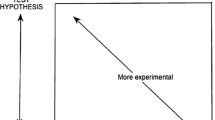Abstract
In this study, students enrolled in a basic physics class participated in one of the online citizen science projects available on the Zooniverse website (www.zooniverse.org) as a homework assignment. They then wrote a 300–500-word reflection about their experience addressing several questions given as prompts. The analysis of the responses showed that a majority of the students enjoyed the experience saying that it was interesting, fun, and accessible. Many responses described a part of their science ideas that were either confirmed or changed by the experience. The science ideas included statements about looking for correlations among many data, the need to observe these data in order to find correlations, and the inherent uncertainty of the task and the data themselves. The ideas about science and scientific research expressed were in line with a competent view of science (Lederman, Handbook of Research on Science Education, 2, 831–879, Lederman, 2007; McComas et al., Science & Education, 7(6), 511–532, McComas, Almazroa & Clough, 1998). The insight given by this study is that participation in a citizen science project can be educationally beneficial in learning about aspects of the nature of science.
Similar content being viewed by others
References
Akerson, V. L., & Hanuscin, D. L. (2007). Teaching nature of science through inquiry: Results of a 3-year professional development program. Journal of Research in Science Teaching, 44(5), 653–680.
Alters, B. J. (1997). Whose nature of science? Journal of Research in Science Teaching, 34(1), 39-55.
Barman, C. R. (1999). Students’ views about scientists and school science: Engaging K-8 teachers in a national study. Journal of Science Teacher Education, 10(1), 43–54.
Bianchini, J. A., & Colburn, A. (2000). Teaching the nature of science through inquiry to prospective elementary teachers: A tale of two researchers. Journal of Research in Science Teaching, 37(2), 177–209.
Capps, D. K., & Crawford, B. A. (2013). Inquiry-based professional development: What does it take to support teachers in learning about inquiry and nature of science? International Journal of Science Education, 35(12), 1947–1978.
Chambers, D. W. (1983). Stereotypic images of the scientist: The draw-a-scientist test. Science Education, 67(2), 255–265.
Clough, M. P., & Olson, J. K. (2008). Teaching and assessing the nature of science: An introduction. Science & Education, 17(2), 143–145.
Corbin, J. M., & Strauss, A. L. (2008). Basics of qualitative research 3e. Thousand Oaks, CA: Sage Publications, Inc.
Finson, K. D. (2002). Drawing a scientist: What we do and do not know after fifty years of drawings. School Science and Mathematics, 102(7), 335–345.
Fralick, B., Kearn, J., Thompson, S., & Lyons, J. (2009). How middle schoolers draw engineers and scientists. Journal of Science Education and Technology, 18(1), 60–73.
Freitag, A., Meyer, R., & Whiteman, L. (2016). Strategies employed by citizen science programs to increase the credibility of their data. Citizen Science: Theory and Practice, 1(1).
Irwin, A. R. (2000). Historical case studies: Teaching the nature of science in context. Science Education, 84(1), 5-26.
Lederman, N. G. (2007). Nature of science: Past, present, and future. Handbook of Research on Science Education, 2, 831–879.
Lederman, N. G., & Zeidler, D. L. (1987). Science teachers’ conceptions of the nature of science: Do they really influence teaching behavior? Science Education, 71(5), 721–734.
Masters, K., Oh, E.Y., Cox, J., Simmons, B., Lintott, C., Graham, G., Greenhill, A., & Holmes, K. (2016). Science learning via participation in online citizen science. arXiv preprint arXiv:1601.05973.
McComas, W. F. (1996). Ten myths of science: Reexamining what we think we know about the nature of science. School Science and Mathematics, V(I), 10–16.
McComas, W. F., Almazroa, H., & Clough, M. P. (1998). The nature of science in science education: An introduction. Science & Education, 7(6), 511–532.
Mead, M., & Metraux, R. (1957). Image of the scientist among high school students. Science, 126(3270), 384–390.
National Academy of Sciences. (2012). A framework for K-12 science education: Practices, cross-cutting concepts, and core ideas. Washington, DC: National Academy Press.
National Research Council. (2013). Next generation science standards: For states, by states. Washington, DC: National Academies Press.
National Research Council. (1996). National science education standards. Washington, DC: National Academy Press.
Newmann, F. M. (1992). Student engagement and achievement in American secondary schools. New York, NY: Teachers College Press.
Osborne, J., Collins, S., Ratcliffe, M., Millar, R., & Duschl, R. (2003). What “ideas-about-science” should be taught in school science? A Delphi study of the expert community. Journal of Research in Science Teaching, 40(7), 692–720.
Schizas, D., Psillos, D., & Stamou, G. (2015). Nature of science or nature of the sciences? Science Education, 100, 706–733.
Schwartz, R. S., Lederman, N. G., & Crawford, B. A. (2004). Developing views of nature of science in an authentic context: An explicit approach to bridging the gap between nature of science and scientific inquiry. Science Education, 88(4), 610-645.
Schwartz, R., & Lederman, N. (2008). What scientists say: Scientists’ views of nature of science and relation to science context. International Journal of Science Education, 30(6), 727–771. https://doi.org/10.1080/09500690701225801.
Schwartz, R. S., Lederman, N. G., & Crawford, B. A. (2003). Developing views of nature of science in an authentic context: An explicit approach to bridging the gap between nature of science and scientific inquiry. Science Education, 88(4), 610–645.
Solomon, J., Duveen, J., Scot, L., & McCarthy, S. (1992). Teaching about the nature of science through history: Action research in the classroom. Journal of Research in Science Teaching, 29(4), 409-421.
Straub, M. (2016). Giving citizen scientists a chance: A study of volunteer-led scientific discovery. Citizen Science: Theory and Practice, 1(1).
Trumbull, D. J., Bonney, R., Bascom, D., & Cabral, A. (2000). Thinking scientifically during participation in a citizen-science project. Science Education, 84(2), 265–275 www.zooniverse.org.
Author information
Authors and Affiliations
Corresponding author
Electronic Supplementary Material
ESM 1
(DOCX 13 kb)
Rights and permissions
About this article
Cite this article
Straub, M.C.P. A Study of Student Responses to Participation in Online Citizen Science Projects. Int J of Sci and Math Educ 18, 869–886 (2020). https://doi.org/10.1007/s10763-019-10001-8
Received:
Accepted:
Published:
Issue Date:
DOI: https://doi.org/10.1007/s10763-019-10001-8




